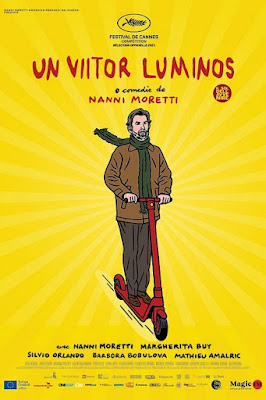Nanni Moretti’s funny, whimsical and delectably messy A Brighter Tomorrow is as much a return to the wry, verbose and self-reflexive films of his past – it’s filled with infectious references to his greatest hits like Dear Diary, April, etc. – as a self-deprecating expression of his being out of sync with the world around him and his inability to fit in anymore, leading to both professional and existential crises. Furthermore, aside from its metatextual elements, ironic self-critiques, impish personal absorptions and unabashed self-indulgences, it’s also a loving evocation of his left-wing political ideals. Giovanni (Moretti’s quintessentially neurotic, cantankerous and chatterbox filmmaker alter-ego, played by himself) is shooting a film around the tremendous moral crisis faced by a L'Unità’s editor (Silvio Orlando) upon being urged by his defiant secretary/fiancée (Barbora Bobulova) to show solidarity with a traveling circus troupe in response to the Soviet invasion of Hungary in 1956, which ultimately leads to the Italian Communist Party’s forging a new path. He’s constantly distracted, however, because of multiple reasons – his luminous wife (Margherita Buy), who’s produced all his films so far, is planning to divorce him, as he sucks the oxygen out of the room; his lead actress keeps improvising to his chagrin; he’s heavily tempted to make a rom-com and an adaptation of John Cheever’s “The Swimmer”; and the arrest of his dubious French producer (Mathieu Amalric) has left him in a lurch. The film is filled with hilarious digressions, including Giovanni halting the shooting of an action-thriller movie for an all-night diatribe on its problematic display of violence, and his riotous tryst with Netflix. The elegiac finale, one hopes, isn’t indicative of Moretti’s plans to walk into the sunset.
Director: Nanni Moretti
Genre: Comedy/Social Satire/Film a Clef
Language: Italian
Country: Italy



















